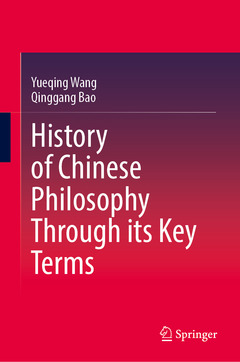Description
History of Chinese Philosophy Through Its Key Terms, 1st ed. 2020
Authors: Wang Yueqing, Bao Qinggang, Guan Guoxing
Language: English
Subject for History of Chinese Philosophy Through Its Key Terms:
Approximative price 105.49 €
In Print (Delivery period: 15 days).
Add to cartPublication date: 03-2020
Support: Print on demand
Approximative price 105.49 €
In Print (Delivery period: 15 days).
Add to cartPublication date: 03-2021
439 p. · 15.5x23.5 cm · Paperback
Description
/li>Contents
/li>Biography
/li>Comment
/li>
Provides a conceptual overview of the evolution of Chinese philosophy from its earliest beginnings to the end of the imperial era
Focuses a broad field – the history of Chinese philosophy – using the lens of key terms
All chapters are self-contained and can be read separately
These books may interest you

Chinese Philosophy 21.43 €



